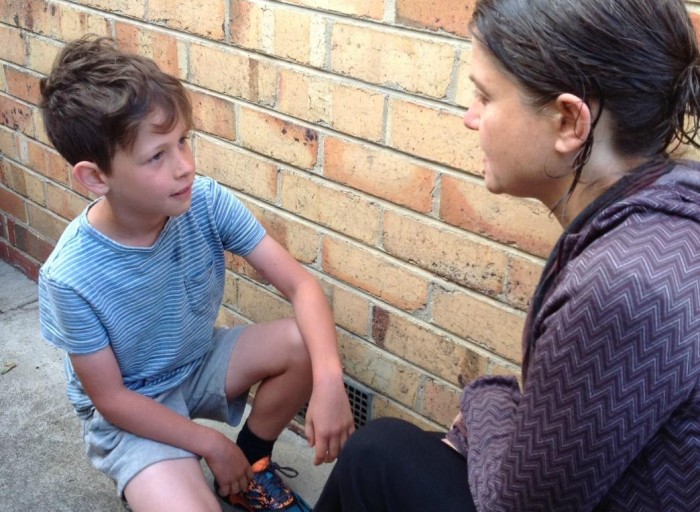I have never punished my child.
This is not because I have some kind of freakishly perfect child. Sometimes I am upset by the actions of my eight-year-old son and I have been stretched beyond my own boundaries many times. This can be really tough.
But punishment is never an option.
Punishing my child does not help me achieve my main aim as a parent. My mission as a parent is to maintain a loving, respectful, empowering and clear relationship with my son, so that he can have a relationship with himself based on self-love, self-respect, self-empowerment and self-understanding.
Punishment does not contribute to self-love, self-respect, self-empowerment and self-understanding. Punishment involves doing something to the child that the child does not like to “teach” them not to do the undesired behavior again.
A threat usually precedes punishment. “If you don’t put your sun-hat on now, then we will leave the playground.” I know many parents will say that punishment teaches “boundaries.” Many parents will talk about using the technique of discussing “consequences.” This could involve a genuine explanation of what may happen but is nearly always another version of punishment.
The flip-side of punishment is reward—giving the child something positive to encourage the desired behavior in the child.
Punishment, threats and rewards are manipulative strategies. They involve a parent wielding control and power over their child. Power-over is not the same as power within or power with others. Punishment undermines the very basis of parenting—maintaining a safe, clear, loving relationship between parent and child. Punishment may change behavior in the short-term but at a great cost to the long-term relationship between parent and child. Punishment and reward is an imposed external control of the child and undermines the capacity of the child to learn ways to be and act in the world for themselves.
Underneath these power-over strategies is usually a sense of parental powerlessness. I empathize with the powerlessness that parents can feel. Parents are usually unsupported, isolated and unacknowledged as they carry out, year after year, day after day, one of the most demanding jobs on the planet. I also acknowledge the powerlessness of children. Children remain a highly disempowered sector of our society in too many ways to outline here.
This following example is extreme but I want you to step into the feeling for a moment of being punished. Imagine that you scratched the car when driving. Your partner is furious and then says you are never to drive the car again. (Of course this is an extreme reaction and hopefully unlikely in real life, except in abusive relationships.)
For the sake of the exercise, imagine how you feel being punished like this. You can never drive the car again! Imagine if your partner frequently punished you, in small ways, most days. Imagine the fear, resentment, anger and shame that would build up and the resulting undermining of trust and empowerment.
A healthy adult relationship is not based on punishment. We do not punish our friends, partners, colleagues. Why do we think we can punish children?
So what do we do when our child is doing something that is upsetting us? Can we create a relationship with our children based on sharing power? Can we explore boundaries through empowered and truthful conversation and true listening? Can we bring a deep awareness to ourselves and to our child, a deep listening, so we can act with clarity? Can we parent in a way that makes punishment, threats and rewards irrelevant?
I believe we can. I am doing it and I am just an ordinary person with an ordinary child. We will all find our own ways of parenting with awareness. Here are some ideas that have worked with me.
Firstly if my child does something that is upsetting, the main approach I have is to have a conversation with my child. A conversation. A conversation is a two-way dialogue based on mutual listening.
A conversation is not the parent going into a monologue that presumes the parent has the answer and needs to direct the show. A conversation involves mutual expression and listening to understand, to then know how to act. True conversation and listening is the basis for creating a loving, safe and clear relationship. The parent needs to role model the expression and the listening that is required to resolve conflict.
Here are three crucial steps to take in this conversation for conflict resolution:
Firstly, I listen to my child. This is vital. The parent needs to take the leadership role here in role-modelling effective ways to resolve conflict. I reflect back what my child is feeling and needing so that my child feels listened to. Sometimes a child’s behavior stems from not being listened to. Listening is vital.
Then I also express how I feel and what I need, as the parent. This is important and I notice that many parents do not actually say how they feel and what they need, with their children. It is vital, and in fact empowering and powerful, for the parent to express their own need to their child. In this way they become visible to the child. When a parent goes into a monologue that focuses on the child’s behavior, a child will often switch off and ignore the parent (leading to great parental frustration!). Many parents don’t actually say how they feel and what they themselves need!
Lastly, I explore solutions. State your child’s point of view, your own point of view with an equal respect for both sides of the story. Ask the child’s ideas for solutions.
Let’s explore an example:
Child—NO!! I am NOT LEAVING!!
Parent—You really want to stay.
Child—Yes, I am NOT LEAVING.
Parent—You love it here and you want to stay.
Child—You can’t make me leave!
Parent—No, I won’t make you leave.
Child—I don’t want to go.
Parent (quietly and assertively)—You don’t want to go…..I feel worried about staying here longer because I need to get to work on time.
Child—Oh….but I want to stay..
Parent—Yes, you want to stay. I need to leave soon so I can get to work on time. What do you think we should do? I need to go to work but you want to stay.
Child—Well…..Can we stay 10 more minutes, then go?
Parent—Okay, that’s a good idea. I don’t feel worried anymore and you can play here for 10 more minutes.
It can look glib in writing but to really listen to your child is powerful and empowering. To say what you need as a parent is powerful and empowering. Over and over again, this has worked for me: to really listen to my child and to say what I need. Keeping the tone expressive, genuine, but without the use of shouting, threats or punishment is important. To ask the child for their ideas on how to solve a dilemma is also empowering for the child.
Interactions between child and parent can get heated and intense. These interactions can trigger the parent’s own wounds from childhood. As parents we need to feel all our emotions brought up by interacting with our children, in a safe space, away from our children.
If we notice that we are being reactive, angry or aggressive with our children, then that is a sure sign that more work on ourselves is needed.
Parenting is an ongoing journey of self-awareness. It can be a bumpy road at times and I have often made mistakes. For example, making threats can be very subtle and sometimes threats would creep into my own and my partner’s parenting. It is a personal achievement of mine that my son could say to me or my partner when he was three years old, “Hey! That’s a threat!” and I would humbly acknowledge he was right and begin again.
Of course, punishment, reward, threats and other forms of violence are behaviors that are deeply entrenched in our society, workplaces, the legal system, our governments and our schools. Domestic violence and war, for example, are widespread dysfunctional ways of dealing with conflict and involve a punishing of the adversary.
Our world desperately needs better ways of responding to conflict! Our children can be given this opportunity to powerfully participate in conversation for conflict resolution, based on true listening. Then they will be more likely to try another way and to engage in dialogue to resolve conflict, as adults.
I hold a commitment to show my son this other way.
Relephant:
Compassionate Listening Without Being a Doormat.
How Overwhelmed Parents can Find Joy (Again).
Author: Anahata Giri
Apprentice Editor: Terese Keehan / Editor: Catherine Monkman
Image: Author’s own







Read 6 comments and reply